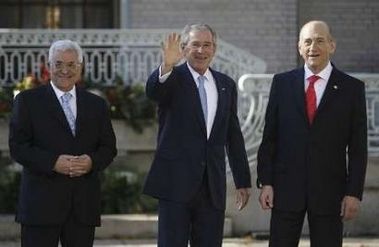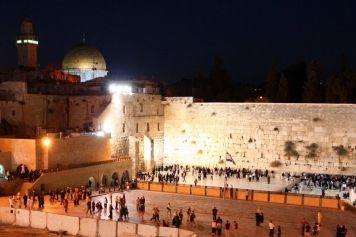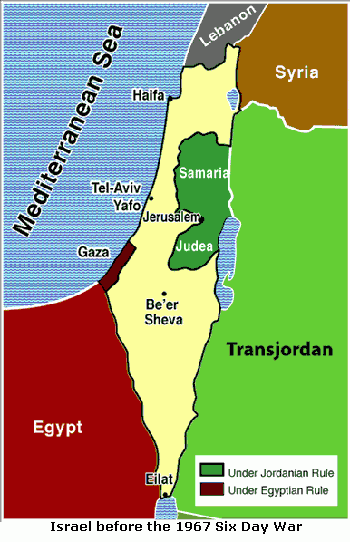 As world leaders and journalists continue their talks in the colonial city of Annapolis, the Main Stream Media are already weighing in on the prospects of success for today’s Mideast peace conference.
As world leaders and journalists continue their talks in the colonial city of Annapolis, the Main Stream Media are already weighing in on the prospects of success for today’s Mideast peace conference.
Nobody knows what the post-conference future holds, but this much is clear: Israel’s status as a Jewish state, sovereignty over Jerusalem, the demarcation of borders, and the fate of Palestinian refugees are among the core issues the media will show renewed interest in.
The purpose of this primer is to help readers monitor coverage in their local papers and participate in the public debate.
The Jewish State
One of Israel’s most fundamental demands is Palestinian recognition of Israel as a Jewish state. The Jewish people have a right to self-determination in their ancient homeland the only state in the world with a Jewish majority. That right is recognized implicitly for every nation on Earth, and should not be denied to the Jewish nation.
Israel’s Jewish identity has been recognized internationally. The 1947 UN Partition Plan divided the area under the British Mandate into a Jewish state and an Arab state. The Jews accepted this plan. However, the Arabs rejected it and launched a war to capture the entire territory.
The Palestinians continue to reject Israel’s most basic self-identity to this day. As Boston Globe columnist Jeff Jacoby wrote, the Palestinian refusal to meet Israels basic demand creates deep suspicions about their real motives.
“The refusal of the Palestinian Authority to acknowledge Israel as a legitimate Jewish state isn’t a denial of reality; it is a sign of their determination to change that reality, he wrote. Like Arab leaders going back a century, they seek not to live in peace with the Jewish state, but in place of the Jewish state.”
Real peace between Israel and the Palestinians can only come only after the Palestinians abandon their dream of Israels destruction and reconcile themselves to Israel’s identity as a Jewish state.
Jerusalem
No place on Earth cuts to the soul of the Jewish people as deeply as Jerusalem. Ancient Zion – conquered by King David 3,000 years ago and the site of the two holy Temples continues to serve as the emotional and spiritual home for the Jewish people.
 Not surprisingly, questions regarding the status of Jerusalem are among the most contentious core issues dividing Palestinians and Israelis. The Palestinians want the eastern half of the city where many holy sites are located as the capital of their future state.
Not surprisingly, questions regarding the status of Jerusalem are among the most contentious core issues dividing Palestinians and Israelis. The Palestinians want the eastern half of the city where many holy sites are located as the capital of their future state.
Despite centuries of exile, the Jews maintained a continuous presence in Jerusalem. What the media often call “Arab East Jerusalem” usually refers to areas temporarily under Jordanian rule from 1948 to 1967 and restored after the Six Day War. Those areas include the Old City and Judaism’s holiest sites, the Temple Mount and Western Wall.
Eastern Jerusalem also includes numerous Jewish neighborhoods outside the Old City walls. Any division of the city along ethnic lines is far more complex than it appears on the surface. Moreover, Israeli media reports indicate that Arabs living in Jerusalem already enjoy Israeli social benefits like health care and don’t necessarily want to live under PA jurisdiction.
In addition, Israel has a proven track record of ensuring full access to the city’s holy sites. Can the Palestinian Authority be trusted to safeguard these sites for all religions?
Borders
 For many Israelis, final borders are ultimately a question of security. Dore Gold, the former Israeli Ambassador to the UN, has argued for Defensible Borders because any Palestinian effort to dismantle the terrorist infrastructure is destined to be incomplete. This approach rejects any return to the 1948 armistice line (the “Green Line”) on the grounds that it leaves Israel vulnerable and calls for retaining parts of the West Bank vital to security, such as the Jordan River Valley.
For many Israelis, final borders are ultimately a question of security. Dore Gold, the former Israeli Ambassador to the UN, has argued for Defensible Borders because any Palestinian effort to dismantle the terrorist infrastructure is destined to be incomplete. This approach rejects any return to the 1948 armistice line (the “Green Line”) on the grounds that it leaves Israel vulnerable and calls for retaining parts of the West Bank vital to security, such as the Jordan River Valley.
In contrast, the Palestinians demand an independent state in the entire West Bank and Gaza Strip. After the 2000 Camp David talks broke down, former PA Chairman Yasser Arafat claimed then-Prime Minister Ehud Barak offered the Palestinians nothing more than West Bank Bantustans islands of independent territory without viable contiguity. This claim has been completely rejected by Ambassador Dennis Ross, the chief negotiator for the U.S. at Camp David.
Contiguity raises a host of practical questions. Can borders be adjusted for demographics, leaving Jewish-populated areas in Israels hands? Will Israel have to trade territory inside Israel in order to keep the settlements? Can Israel retain highly populated settlement areas such as Maale Adumim and the Gush Etzion bloc?
Refugees
Another core issue is the Palestinian demand for a right of return for refugees into areas inside Israel. These refugees are Palestinians and their descendents who fled the territory following the outbreak of war in 1948. According to UN figures, there are currently more than 4.4 million refugees.
Any discussion of Palestinian refugees should also note that Israel absorbed 856,000 Jewish refugees from Arab countries with little to no international assistance, while 711,000 Palestinians left Israel-controlled territory in 1948 and 1949.
An influx of millions of Palestinians would threaten Israels Jewish identity and, in time, could lead to a Palestinian majority in the Jewish state. At the same time, Palestinian negotiators also demand the creation of an independent Palestinian state alongside Israel.
Not surprisingly, Israel rejects Palestinian return as non-starter. The Israeli Foreign Ministry calls the demand a threat to the two-state solution:
“The Palestinian claim of unlimited immigration to Israel is a political ploy made by those who do not want Israel to exist. It is disingenuous that the Palestinians are simultaneously appealing for a state of their own while calling for the right to freely immigrate to yet another state, Israel. By continuing to demand a right that would, in effect, negate the basic identity of Israel, the Palestinian leadership is undermining prospects for peace. The result of any peace process should be two nation states for two people, as envisioned by the United Nations in 1947, in the partition plan.”
Any workable return for refugees must be limited to the Palestinian territories. And any reparations must include a contribution from the Arab world. As Mitchell Bard writes,
“Had the Arabs accepted the 1947 UN resolution, not a single Palestinian would have become a refugee and an independent Arab state would now exist beside Israel.”
The negotiations will certainly take time. But as meaningful talks on these contentious issues move forward, increased media debate is inevitable. Given the complexity of these issues, news reports may contain inaccurate information. For additional resources, see our Brief History of the Region as well as our media critique archives.
And we urge readers to monitor their local coverage and make their voices heard.
DISHONEST REPORTER AWARD 2007
 Who will be awarded 2007’s Dishonest Reporter? It’s up to you! This is your chance to holler back at the media.
Who will be awarded 2007’s Dishonest Reporter? It’s up to you! This is your chance to holler back at the media.
Send your nomination to [email protected] and we’ll announce the results in a special communique in the coming weeks.
Due to the volume of mail, we are not able to acknowledge all nominations, but we do appreciate them.

